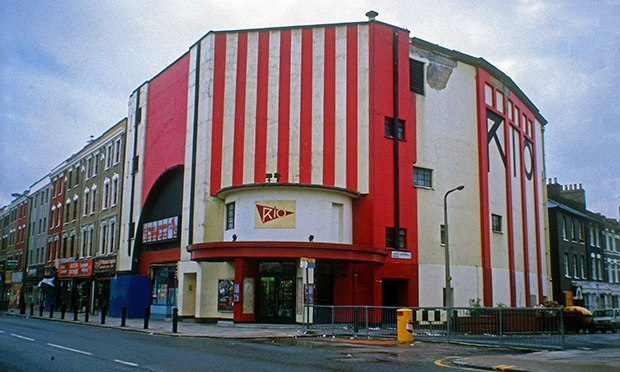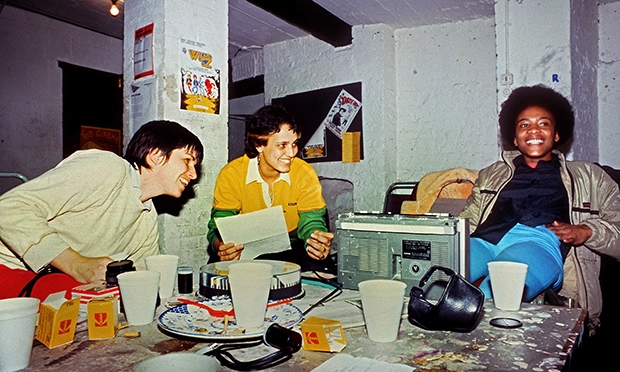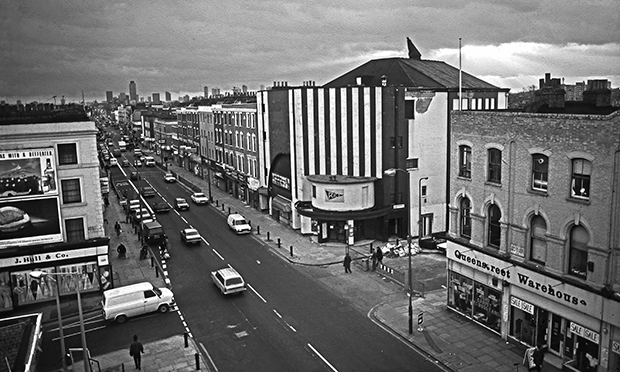Rio Cinema celebrates Hackney’s politically-charged film history

The historic Rio Cinema. Photograph: Rio Cinema
The art deco marvel overlooking Kingsland High Street is more than just the jewel in the crown of Dalston’s architecture, but the last bastion of independent cinema with vivid memories of political turbulence and creativity.
‘One Day in Hackney’, a screening of four homegrown short films taken from across five decades of Hackney’s history, sees the Rio’s team partner up with the London School of Architecture and writer and producer Andrew Woodyatt.
The event cements the cultural significance and cinematic history of both the Rio and the borough at large.
We start with avant-garde filmmaker John Smith’s The Girl Chewing Gum (1976), a 12-minute short depicting everyday happenings on an ordinary street corner off Stamford Road, cryptically narrated by an omniscient voice directing the action of each passerby.
Two films by the Rio Slide/Tape Archive, a community photojournalist group, follow: One Day in Hackney and One Day Off in Hackney. These comprise of a series of evocative stills overlaid with chintzy ska and reggae music and spoken poetry.
The slides, recovered by Woodyatt in 2016 from a filing cabinet in the cinema basement, have that rare ability to illuminate both the prosaic and the quirky occurrences: geese in the streets, kids’ swim clubs, and the old Centerprise community centre.
Here we see the borough’s diversity and political faultlines in glorious saturated technicolour, its scenery brimming with decay and transformation—a microcosm for the capital itself.

Members of the Rio’s Slide/Tape Archive group. Photograph: Rio Cinema
The screening’s centrepiece is Own Home? from writer-director Bec Evans. It depicts a dystopian near-future where London’s homeowners have government-issued shutters that hide entire building structures in cocoons of iron, transforming them into “morbid lego blocks” covering the urban landscape as a means of protecting residents from dispossessed rioters.
“The story came out of being in a sticky living situation,” Evans tells the audience.
Having suddenly been turfed out of a flat on Upper Clapton Road, she and a friend took up the offer to stay in another friend’s house. But this act of kindness crystallised Evans’ awareness of the discriminatory yet rudimentary lines society draws between homeowners and private renters, and indeed those without either.
“My mind tends to work in extremes and masochistic self-deprecation. We were projecting all of our desires and dreams, seeing ourselves reflected in this space which was not ours. Out of that came this dystopian world which to me felt far too close,” says Evans.
The result is playful yet jarring, an uncompromising look at the reality of home ownership in a housing crisis.
The real strength of Own Home? is how it compacts the intimate and relatable dynamic of its two main characters, Em and Ly, within a politically-charged horror setup.
These two people are thrown into an unfamiliar territory but their relationship feels sincere and well-rounded. It’s what lets the theme of collusion land with real force: as the faceless rioters begin to terrorise our protagonists outside the iron windows, one wonders how different their reaction would be despite society’s awareness of housing shortages.

The Rio ‘flourished as a centre of communities’. Photograph: Rio Cinema
The film’s setting could be anywhere, but its message of dislocation and collusion resonates in a borough struggling to retain its identity under an avalanche of gentrification.
“I’m always interested in what gentrification does to identity, what it does to the question of home,” says Evans.
“In my filmmaking I’m always wanting to interrogate my complicity in the system in which we live, what everyone else’s complicity in that system is, and how much agency we have.”
She is nonetheless eager to assure the audience that this is a hopeful film.
After the show, Woodyatt takes the audience to the setting of The Girl Chewing Gum, a five-minute walk from the Rio, where the long-gone Dalston Odeon used to be.
We learn how the litter of early film houses across the city came about from London’s brief fling with roller skating. After one too many high-heeled skaters inevitably broke their ankles, something had to be done about a litany of disused roller rinks.
The subsequent boom included the ABC theatre-turned-cinema (now EartH), the Plaza on Kingsland Road, and a Yiddish language cinema that would later become the Aziziye Mosque. All are now either demolished or converted – one notably became the Four Aces, the capital’s very first Black music club – but the Rio has stood firm.
“It flourished as a centre of communities, but also a lot of activism,” says Woodyatt.
Not only was it the very first cinema to have a female programming group, it “became a platform for the work of female directors, and the centre for a lot of political protest”.
He points to the Rio’s stage as the site of one of the early Rock Against Racism gigs, along with antique photos of Jewish residents facing down Oswald Mosley out front, cementing the cinema as a key fixture in Hackney’s radical history.
It has taken a few detours, mind you —notably as the borough’s leading adult cinema and strip joint, The Tatler.
Exotic tales are bound to follow, and Woodyatt delivers: allegedly, cinema staff had to leave sleepy serpents on projectors during film showings so that they would stay warm and awake in time to be worn by striptease dancers post-screening.
Today, the cinema’s culture has returned to the traditions of progressive programming—notably elevating queer and migrant voices in film.
“I think, number one, making a film is a political act. Most films, if you look at them, have something political to say about them,” Woodyatt told the stragglers who followed him down to the LSA pavilion post-screening.
We should hope that the Rio endures as home not just for blockbusters and indie films, but as a stage for Hackney’s inimitable voices.
The full ‘Rio Tape/Slide Archive books with historic stills of the borough are available for sale for £25 from the Rio Cinema.
The cinema’s second event in partnership with the LSA, ‘Legacy in the Dust: The Four Aces Story’, takes place Saturday 29 June.
